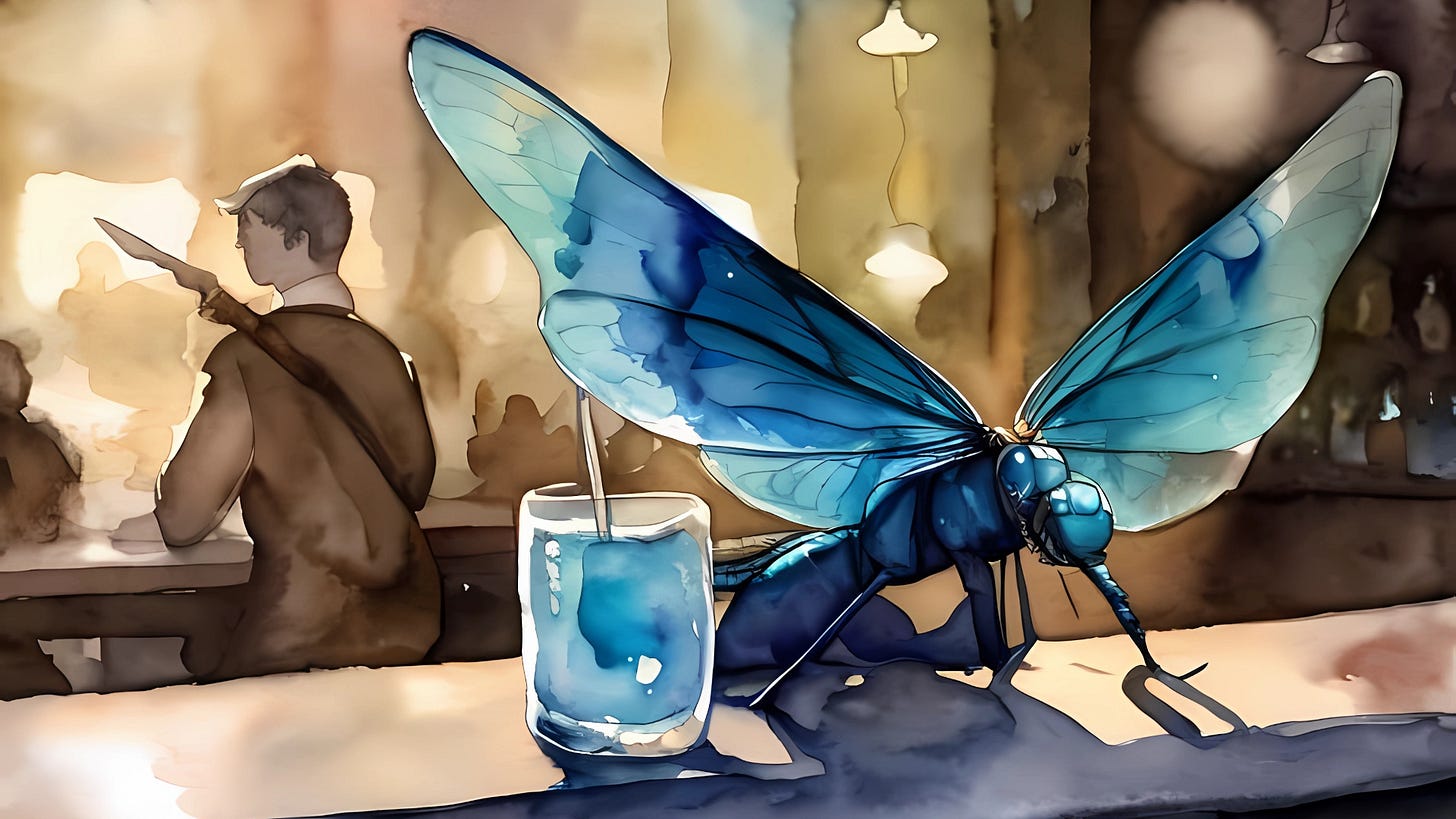Long ago, I’d compose dragonfly sonatas, weaving webs across frets, building songs so fine-tuned: melody, counterpoint, befitting of martyrs. I had songs that became a buzz for all they swoon’d- until the arrival of a cold, hard season, killing my writing bug, leaving the deepest wound. Mandibles biting down on the vice of reason, I ate the larvae of my final brood of hope. Abdomen churning tight, knowing I had treason’d. Now I spin drawn-out notes: discordant, faltering, cocooning by the bar, I’m just a twitching fly, Tangled up in my web of sorrows, lamenting. My mind can only drone a swarming beehive cry, whenever I am drawn to write by the lamplight, cricket chirp drowning my tiring hymn with its sigh.
Lament of a Dying Dragonfly ~ A Poem by Tom Shaw
When I first began writing this piece, I hadn’t made the connection with the day’s prior events. While in Amsterdam in early March, I made time to share some poems at an open mic night in the city, and at the end of the night I got talking with a few of the other poets. Unexpectedly, our conversation turned to the state of contemporary poetry, with its uncompromising political agendas, victimisation of self and disregard for the creative constraint that comes with poetic technique and form.
What has become of creatives with a reverence for classical styles - especially those of younger generations? Like so many with artistic skill and capabilities, but unable to find an avenue to express it because it isn’t deemed “commercially viable” in the current cultural landscape, they’ve become barflies. They lament on the state of the world and chastise the plague of locust and their TikTok-tuned chorus.
I say this as someone familiar with this world and dance. I’ve poured pints on evenings to fund a roof over a nest where I could nurture my creative juices - as well as other jobs. To a degree, I still do, although I’m much better at finding avenues that complement my writing and offerings in other ways that isn’t just monetary.
But it is not the lovers of the art form that get grant money, literary prizes and marketing machines behind them. As a society, we are not rewarding poets based on the artistic merit of their works. We praise those who subvert the pursuit of truth and beauty into something shallowly shocking. As Andrew Benson Brown of Classical Poets Live highlights in a fantastic video on this subject, creative schools promote a form of soulless minimalism in poetry in attempt achieving “equality”.
This is not what poetry is intended for. If anything, poetry at its best does the opposite, in allowing us to see and experience emotions from a perspective that isn’t our own, or to reawaken something suppressed in us by the banality and uniformity of the modern condition. It is for reconnecting with humanity, not castigating it.
The relationship between art and money.
Is this a state we can still achieve or return to? I honestly have no idea. Most of the “alt-media” institutions dipping their toes in the artistic waters are still blind-sided on many cultural issues and compromised by conflicts of interest, which I fear may thwart any genuine interests they may have in reviving the craft of literary arts. Of course, I’m willing to be proven wrong here, and I’m glad at least some are interested in pushing the Overton window this way. But actions speak louder than words.
By its nature, art takes an investment of time and resources (which can include money) that is transmuted into cultural and personal value. The return-on-investment is in the cultural enrichment of society and not monetary (at least directly). In our current setup, those best poised to support the arts are those with significant financial capital, which is most likely coming from captured institutions looking to support particular agendas. This includes “alt-media” institutions. Artists become beholden to appealing to these institutions and the agendas they want to promote just to get their art funded, rather than creating it for the sake of beauty and goodness.
Is there a better remedy we can find? Indirectly, I think better monetary tools could play a part in redressing this balance, and I also think that some AI tools, used judiciously, can actually be used for the benefit of artists in reducing the financial and contractual costs of achieving their visions. The visual arts and film-making strike me as the area most likely to benefit from this, but all forms of art, including poets, would likely benefit from tools that allow them to market themselves more effectively online, translate their works for other audiences and design book covers or merchandise that shares their writings in new forms. Here, the AI dictating the vision of the art, but is being used just as a painter would a paintbrush to help bring their own vision to life in a way that might not have been possible otherwise.
Furthermore, when there’s an increasing number of these technologies becoming open-source or available directly to the artists themselves, then the barflies locked out of success in the traditional avenues might instead get a shot through a more DIY approach. That strikes me as a good thing. Spending less time on the aspects of creation and networking that aren’t strong suits for otherwise talented artists gives more time for them to go and share their creations in the real world and connect with real people.
The choice is mine—and yours.
A future of AI as a useful tool and a future of AI as a dystopian control device are both possible; I believe we can achieve the former should we step into the call-up of our current times to take agency of our own lives and the world around us. We are the authors of the future’s history. So let me ask: what is the story you are writing about yourself? Is it the version of you that laments in bars about the state of the world, or the one where you become the author of your life and the world you inhabit? Are you willing to risk success? Will you eat the bugs of your own demise, or grow the food that nourishes you?
The time to decide is now.
To close, I will leave you with the following words from the Hopi Nation Elders of Arizona, who have recounted the following for thousands of years.
You have been telling the people that this is the Eleventh Hour. Now you must go back and tell the people that this IS the Hour. And there are things to be considered:
Where are you living?
What are you doing?
Are you in right relation?
Where is your water? Know your garden.
It is time to speak your truth.
Create your community. Be good to each other.
And do not look outside yourself for the leader.
This could be a good time!
There is a river flowing now very fast. It is so great and swift that there are those who will be afraid. They will try to hold on to the shore. They will feel they are being torn apart, and they will suffer greatly.
Know the river has its destination. The elders say we must let go of the shore, push off into the middle of the river, keep our eyes open, and our heads above the water. See who is in there with you and celebrate.
At this time in history, we are to take nothing personally. Least of all, ourselves.
For the moment that we do, our spiritual growth and journey comes to a halt.
The time of the lone wolf is over. Gather yourselves!
Banish the word struggle from your attitude and your vocabulary.
All that we do now must be done in a sacred manner and in celebration.
We are the ones we’ve been waiting for.
Thank you for taking the time to read this piece. Let me know if it sparked something within you.
With gratitude,
Tom
Reminder: This Saturday (26th April) I’ll be running an in-person workshop in Bournemouth, UK, on using poetry as a vehicle for making sense of the challenges we face in our lives. There’s still time to book on by following the link here. If I won’t see you there, I look forward to connecting again soon!









